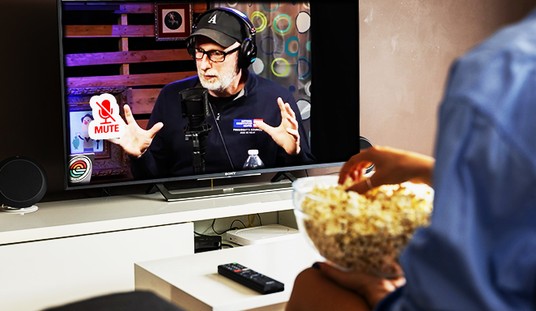Ed Driscoll has a fascinating article on President Obama’s hatred for the Internet, especially social media, as described by Chuck Todd on ‘Meet the Press’. Todd described how the President clearly made his feelings felt at the end of the White House Correspondent’s dinner.
CHUCK TODD: What I wonder how many people realized at the end [of Saturday’s White House Correspondents’ Dinner] when he did his, you know, there’s always this part at the end where they get serious for a minute. And it’s usually the part where presidents say, “You know, I think the press has a good job to do and I understand what they have to do.” He didn’t say that. He wasn’t very complimentary of the press. You know, we all can do better.
It did seem, I thought his pot shots joke wise and then the serious stuff about the internet, the rise of the internet media and social media and all that stuff — he hates it. Okay? He hates this part of the media. He really thinks that the sort of the buzzification — this isn’t just about Buzzfeed or Politico and all this stuff – he thinks that sort of coverage of political media has hurt political discourse. He hates it. And I think he was trying to make that clear last night.
‘But why should Obama hate outlets like Politico?’ asks Driscoll. After all, more than few of its staff members are his supporters. Ed Driscoll writes, “Politico has numerous journalists who during the campaign in 2008 were on the infamous “JournoList,” which dubbed itself the “non-official campaign” for Obama’s election bid.”
Part of the answer to Driscoll’s question comes from Andy McCarthy, who painstakingly examines the administration’s efforts to shape the narrative in the Tsarnaev case. He traces how the administration took credit for preventing the future Times Square bombing when that plot is not even mentioned in the charges against the suspect. He points out how some overly zealous Federal judge showed up to Mirandize Tsarnaev and ostensibly stop the FBI in its tracks when “it was not the magistrate judge who decided Tsarnaev should be Mirandized. It was President Obama and Attorney General Holder”.
He comes to the conclusion that’s it a show, a very deliberate campaign to demonstrate to the public that the “judicialization” of the fight against terrorism works even when it doesn’t.
Because you are being softened up. Steered by its Gitmo Bar veterans and Lawyer Left compass, the Obama administration is executing a massive national-security fraud: the farce that the jihad against America can be judicialized, that civilian-court processes are a better answer to enemy warfare than are combat protocols. …
So in the effort to tame you into believing civilian due process has proved wildly successful in the Marathon bombing investigation, just as Obama and Holder promised it would, the government is now strategically leaking interrogation details.
Sure it may look like the investigation was a tragicomedy of errors in which our $100 billion national-security edifice, despite investigating Tamerlan Tsarnaev for a year and a half before the bombing, had to ask the public’s help in identifying a picture of him. But look: We stopped a spectacular bombing at Times Square! And sure, there’s a lot of innuendo about Islam and overseas “extremists,” but after 16 hours of penetrating scrutiny we’ve figured out that this was just wanton “homegrown” violence committed by a couple of confused kids — the sort of thing that is bound to happen if we don’t crack down on gun ownership and Islamophobia.
The fraud is on. Will we keep falling for it?
Shows are a part of governance, but shows will require a script. In answer to McCarthy’s rhetorical question, many will probably fall for for the show, now that the administration has had time to produce it in the leisurely aftermath of the arrest. But there was a frightening moment while the action was breaking — driven by the Internet and especially by social media — when the drama was unfolding faster than the establishment’s feedback loop could cope. When they couldn’t issue talking points fast enough to their buddies in Politico to spin it. The action outran the script.
That is why the President hates the Internet.
It’s making his life a misery. For instance, first the President planned to address Planned Parenthood, then he canceled his address, then he went ahead and gave the address anyway. What was the unseen hand that was jerking the President around like a puppet on a string? It was nothing the NYT or Washington Post wrote.
No, it was probably his media handler’s response to the state of the public consciousness of Kermit Gosnell ‘House of Horrors’ case. They may at first have feared association with Gosnell but later decided it would be unwise to “give in” to the pressures generated by the Internet buzz surrounding Gosnell. It was a remarkable demonstration of the power of a non-news story over the Chief Executive, and demonstrates both the hidden hand of the Internet and why Obama hates it.
Obama’s problem with Internet memes is not that they can’t be manipulated, but they are extraordinarily hard to manipulate in real time. They outrun his OODA loop and he can only catch up when things settle down.
The problem is particularly acute where the Internet has dense coverage. If the attack on the US consulate in Benghazi had happened anywhere else but in connectivity poor Libya — in Europe, or the prosperous parts of Asia or North America, the facts would have gotten away from the administration before they could herd them back into the narrative. It would have been Boston on steroids.
Thankfully for the administration the remoteness of Libya bought them 72 hours in which they came up the ridiculous story that the entire event had been caused by a video produced in LA. That was Narrative Version 1.
We are now in Narrative Version 2. And the most frightening aspect about the threat by Congress to hold “explosive hearings” on Benghazi is not that any actual detonations will take place but that the scene of action will have shifted to the United States, where everyone has a smartphone, tablet, laptop or computer. And if revelations come thick and fast there will be the need for V 2.1, V3.0, V3.11 and they just can’t cope.
America is the land of the Internet and the social media and if something gets loose in that connectivity-rich environment the Administration will be weeks rounding the horses up.
The principal power of the establishment media consists in being able to shape the Narrative; to determine what is news. The biggest challenge the creators of Talking Points face is velocity. Velocity reduces the time required to get their story straight inside of the accelerated news cycle. It undermines the narrative at the most basic level.
The handmaiden of velocity is multiplicity, that is when breaking news comes out of Left field. This was illustrated once again in the Tsarnaev case by the unmanaged information about the Tsarnaev family in Chechnya. The voluble Mrs. Tsarnaev put paid, probably fatally, to any attempt to portray the Tsarnaev family as simply poor oppressed people who were misunderstood and discriminated against.
It is velocity and multiplicity that constitute the Achilles heel of the media. Their ponderous machinery can hammer anything into a Procrustean bed given enough time. But when pressed they are at a serious disadvantage. One of the administration’s most severe challenges is it has sown the seeds of an increasingly fast and ungovernable news cycle by via the numerous mistakes of Obama’s first term.
Those mistakes will now come home to roost and from the media management point of view the principle threat is that they will break one after the other or all at once.
The next few months are likely to see simultaneous and fast moving challenges to the administration from the economy, terrorism, the Middle East, North Asia and Europe. And those are only the challenges we can reasonably anticipate. Surprises are bound to join them. The strategic political danger facing the President is that he can’t manage a Perfect Storm at sufficient velocity with the Internet and social media on the loose. It would, as the President put it, “hurt political discourse”. Namely it would hurt him.
Dylan Byers inadvertently painted a bull’s eye on the Achilles Heel of Big Media when he described the unrest and politics in the New York Time’s editorial offices.
One Monday morning in April, Jill Abramson called Dean Baquet into her office to complain. The executive editor of The New York Times was upset about the paper’s recent news coverage — she felt it wasn’t “buzzy” enough, a source there said — and placed blame on Baquet, her managing editor. A debate ensued, which gave way to an argument.
Minutes later, Baquet burst out of Abramson’s office, slammed his hand against a wall and stormed out of the newsroom. He would be gone for the rest of the day, absent from the editors’ daily 4 p.m. meeting, at which he is a fixture. …
In one meeting, Abramson was upset with a photograph that was on the homepage. Rather than asking for a change to be made after the meeting, she turned to the relevant editor and, according to sources with knowledge of the meeting, said bluntly, “I don’t know why you’re still here. If I were you, I would leave now and change the photo.”
In another meeting, an editor asked about The Times Company’s recent decision to rename the International Herald Tribune as “The International New York Times.” Abramson reportedly snapped: That issue has been settled, she said. Why would we even bother getting into that?
In a fast moving situation traditional outfits like the NYT with its tattooed Executive Editor flying off to recharge her batteries at Sundance will find it hard to keep up with social media. There will be moments when Obama will have only Politico to carry the load and even Politico may be too slow.
One of the reasons why the society in political crisis shuts down or slows communications is to retard the memes so they can get all the horses back into the corral.
V.I. Lenin once remarked that “quantity has a quality all its own”. But so, he forgot to add, did velocity. That has a quality of its own too. When things go too fast strange things happen as Arthur Henry Reginald Buller pointed out:
There was a young lady named Bright,
Whose speed was far faster than light;
She started one day
In a relative way,
And returned on the previous night.
Well it is the 21st Century.
The Three Conjectures at Amazon Kindle for $1.99
Storming the Castle at Amazon Kindle for $3.99










Join the conversation as a VIP Member